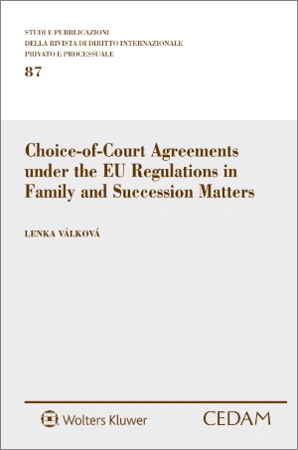Party autonomy has been traditionally considered as one of the leading principles used in cross-border trade law. In fact, choice-of-court agreements have been embedded into the majority of EU Regulations governing civil and commercial matters. On the other hand, mandatory approach to family and succession law slowed down the progress of recognition of party autonomy in these fields. Only in recent years, the trend towards acknowledging choice-of-court agreements has spread into almost all areas of international family and succession law. This publication follows this development: firstly, it analyses the reasons and concerns of the recognition of choice-of-court agreements in civil and commercial matters, whereby it is questioned whether the considerations established in relation to commercial contracts may apply also for personal relationships. Consequently, different treatment of choice-of-court agreements family and succession law, where the freedom to choose the
competent court is far from being unlimited, is examined. Accordingly, the attention must be paid to functions of choice-of-court agreements in family law. The second chapter subsequently investigates the position of parties in personal law relations and their protection. In particular, partial and full exclusion of party autonomy, formal and substantive validity, time limits, substantive review and public policy and overriding mandatory rules are considered as tools for protection of vulnerable parties in family and succession law relations when entering into choice-of-court agreements. Finally, last chapter provides for in-depth analysis of rules on choice-of-court agreements under different EU Regulations (the Brussels IIa and Brussels IIter Regulations, Maintenance Regulation, Regulations on Property Regimes and Succession Regulation), where the strengths and gaps of the rules are highlighted. This analysis includes also an attempt to clarify the problem of derogation from jurisdiction in favour of Third States in presence of choice-of-court agreements. Lastly, effectiveness of the rule on lis pendens in stress-tested.

